Does the Time of Day Affect Cat Socialization Sessions?
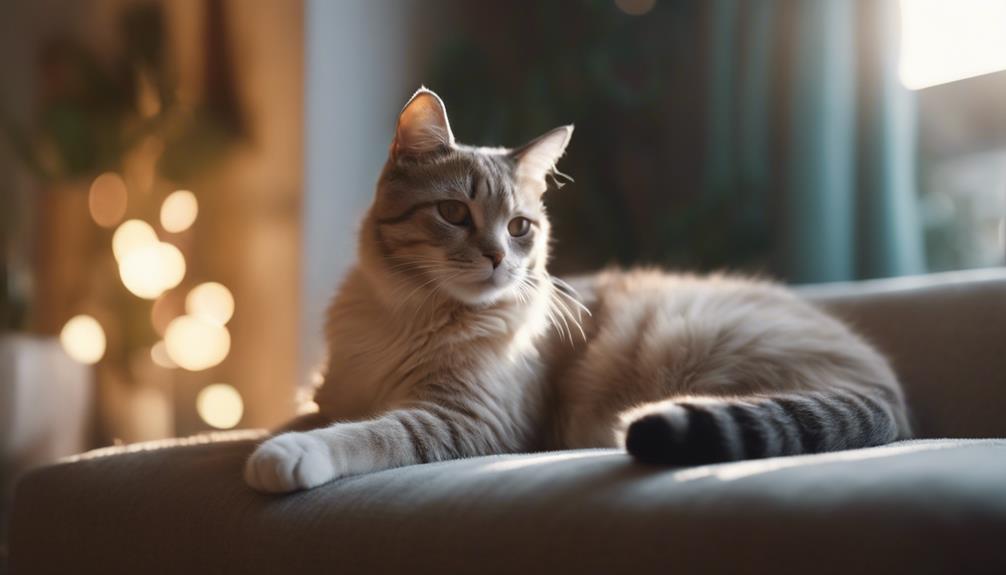
Cat socialization sessions are an essential aspect of feline care, helping cats to become more comfortable and confident in their environment. The time of day at which these sessions are conducted can have a significant impact on their effectiveness. Cats are typically more active and alert during the early morning and late evening hours, making these times ideal for socialization activities.
During these peak times, cats may be more receptive to interaction, play, and training, leading to more successful sessions. In contrast, conducting socialization sessions during the middle of the day when cats are more likely to be resting or less interested in engaging may yield less favorable results. By taking the time of day into consideration and scheduling socialization sessions during peak activity periods, cat owners and caregivers can maximize the benefits of these interactions and help their feline companions thrive.
Morning Socialization Sessions
Morning socialization sessions are crucial for fostering positive interactions between cats and their owners. Cats are known to be early risers, often waking up their owners with gentle nudges or meows. During these morning routines, sleepy cats can benefit greatly from engaging in socialization activities that promote feline bonding.
Research suggests that morning interactions play a significant role in strengthening the bond between cats and their owners. Cats are more likely to be alert and receptive to socialization efforts during this time of day. Engaging with cats in the morning can positively impact their mood and overall well-being, leading to a more harmonious relationship.
Afternoon Bonding Activities
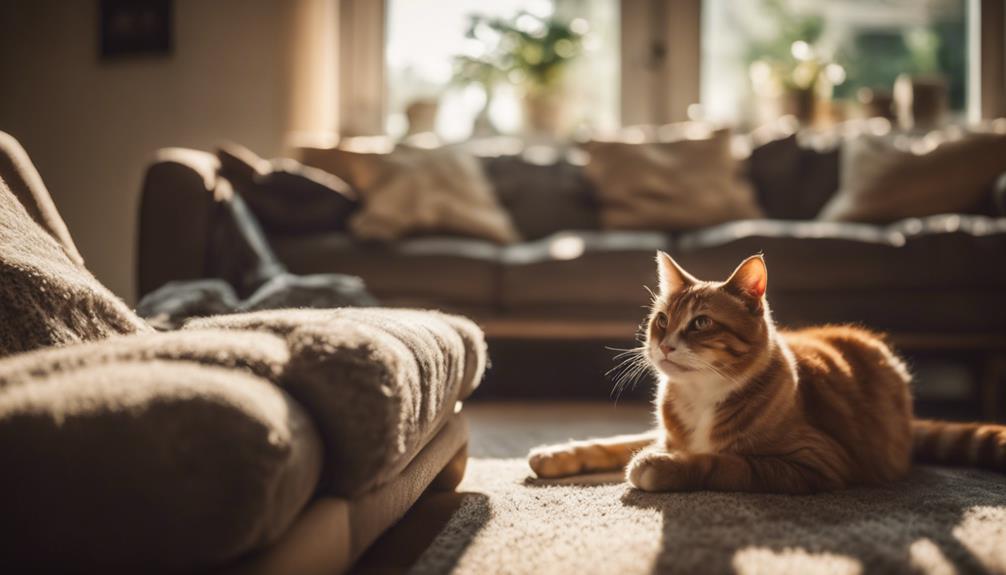
After establishing a strong foundation through morning socialization sessions, incorporating afternoon bonding activities can further enhance the relationship between cats and their owners. Engaging in specific afternoon playtime and bonding skills can significantly impact the socialization process and strengthen the human-feline bond.
Here are three cat-friendly activities that promote afternoon engagement:
- Interactive Toy Sessions: Utilizing interactive toys like feather wands or laser pointers during the afternoon can stimulate a cat's natural hunting instincts, providing mental and physical enrichment.
- Treat Puzzle Games: Introducing treat puzzle games in the afternoon can encourage problem-solving skills and offer a rewarding experience for cats, fostering a positive association with their owners.
- Grooming Sessions: Spending time grooming your cat in the afternoon not only helps maintain their coat and hygiene but also serves as a calming bonding experience, enhancing trust and closeness between the cat and the owner.
Incorporating these afternoon bonding activities can contribute significantly to the overall socialization and well-being of cats.
Evening Interaction Dynamics
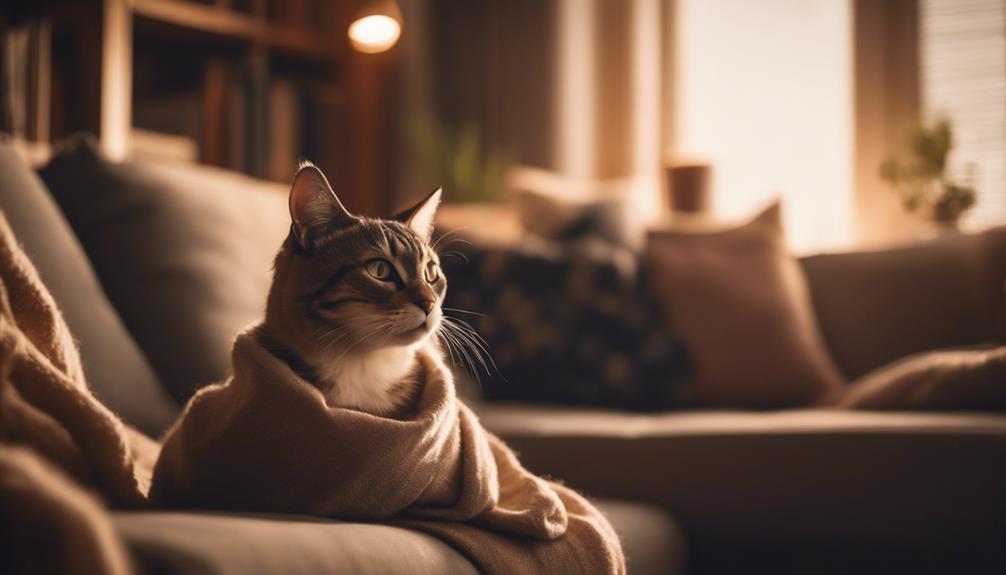
Evening interaction dynamics play a crucial role in the socialization of cats, with unique benefits associated with nighttime engagement. Research suggests that cats may exhibit differing behaviors and responses during morning and evening interactions, potentially influencing their overall social development.
Understanding the dynamics of evening interactions can provide valuable insights into optimizing socialization efforts and enhancing the bond between cats and their caregivers.
Nighttime Socialization Benefits
During the nighttime, cats engage in socialization activities that contribute to their overall well-being and behavioral development. These interactions are crucial for their mental and emotional health, providing opportunities for bonding and stimulation.
Here are three significant benefits of nighttime socialization for cats:
- Late Night Playtime: Cats are often more active during the night, making it an ideal time for engaging in play sessions that can help release excess energy and promote exercise.
- Midnight Snuggles: Cats are known for their affectionate nature, and nighttime can be when they seek closeness and comfort from their human companions, fostering a sense of security and trust.
- Enhanced Human-Animal Bond: Nighttime socialization sessions can strengthen the bond between cats and their owners, leading to improved overall well-being and a deeper connection.
Mornings Versus Evenings
Cats exhibit distinct socialization patterns in the mornings compared to evenings, reflecting variations in their interaction dynamics and behavioral responses.
In the evenings, cats who are more akin to being 'night owls' may show increased playfulness and energy levels, seeking more interactive sessions with their human companions. These late sleepers might engage in more hunting behaviors, stalking toys, and displaying agility in their movements.
On the other hand, morning-person felines, known as 'early risers,' tend to exhibit a calmer demeanor during socialization sessions in the mornings. They may prefer gentle petting and quieter activities, showing a more relaxed approach to interactions.
Understanding these morning versus evening dynamics can assist in tailoring socialization sessions to suit the individual preferences and energy levels of cats.
Benefits of Morning Sessions
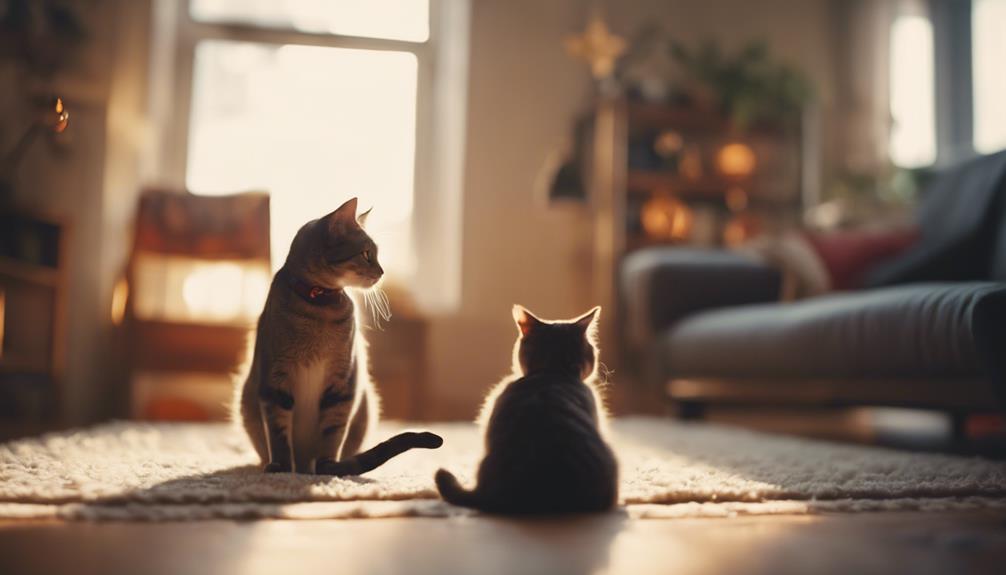
Morning sessions have shown to provide significant benefits in the socialization of cats. When engaging with cats early in the day, there are specific advantages that can enhance the overall socialization process:
- Early Engagement: Cats are often more active and curious in the mornings, making it an ideal time to interact with them. Their increased energy levels can lead to more meaningful socialization experiences.
- Sunrise Connections: The morning light can positively influence a cat's mood and behavior, creating a calm and peaceful environment for socialization. This natural lighting can contribute to a more relaxed and enjoyable interaction for both the cat and the individual engaging with them.
- Enhanced Learning: Research suggests that cats may be more receptive to learning and new experiences in the morning. This heightened receptiveness can facilitate better communication and understanding between the cat and the individual, ultimately fostering a stronger bond.
Challenges in Afternoon Connections
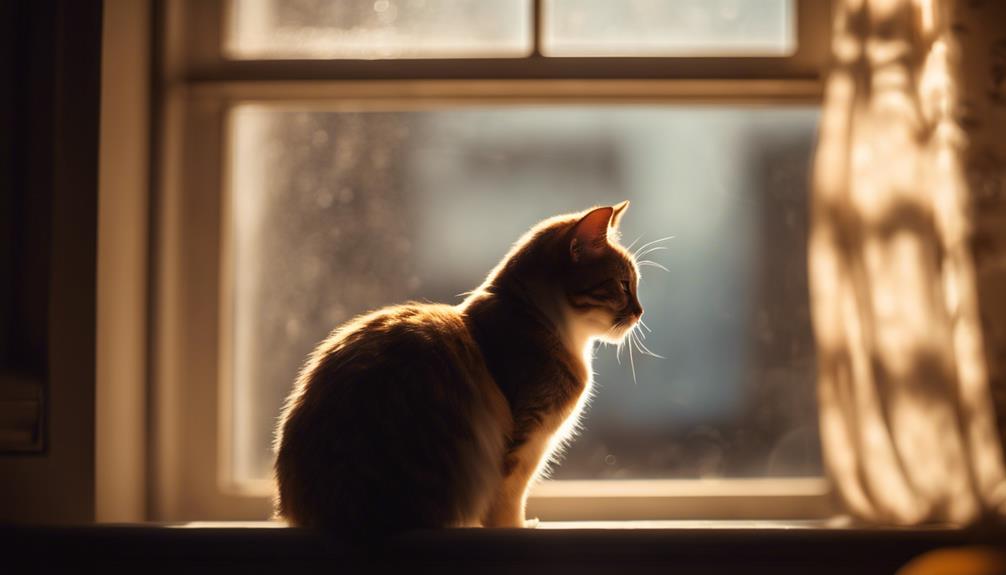
Afternoon interactions with cats may present challenges due to varying energy levels during this time.
Cats might exhibit decreased interest in socialization activities in the afternoon, possibly preferring rest or solitary pursuits.
Home distractions, such as noise or other pets, could also hinder effective afternoon connections with cats.
Afternoon Energy Levels
During the afternoon, feline energy levels often present challenges in establishing social connections with their human companions. Understanding these fluctuations is crucial for successful interactions.
Here are three key points to consider:
- Energy Spikes: Cats may experience bursts of energy during the afternoon, leading to increased playfulness and potential distractions during socialization attempts.
- Midday Slumps: Some cats might exhibit lower energy levels during midday, making it harder to engage in social interactions during this time.
- Evening Engagement: Cats tend to become more active and receptive in the evening, presenting an opportunity for more successful socialization sessions later in the day.
Being mindful of these energy patterns can help optimize cat socialization efforts.
Distractions at Home
Cats encounter various distractions in their home environment that can pose challenges to establishing social connections during the afternoon. Within the home environment, cats may face interruptions from other pets, noises from household activities, or even changes in lighting.
These distractions can impact a cat's ability to focus on socialization efforts, leading to potential barriers in forming connections. When attempting to engage with a cat in the afternoon, caregivers should be mindful of these distractions and strive to create a calm and quiet space to facilitate social interactions.
Minimizing disruptions and providing a comfortable setting can help mitigate the impact of distractions on the cat's attention and receptiveness during socialization sessions in the afternoon.
Maximizing Evening Bonding Time
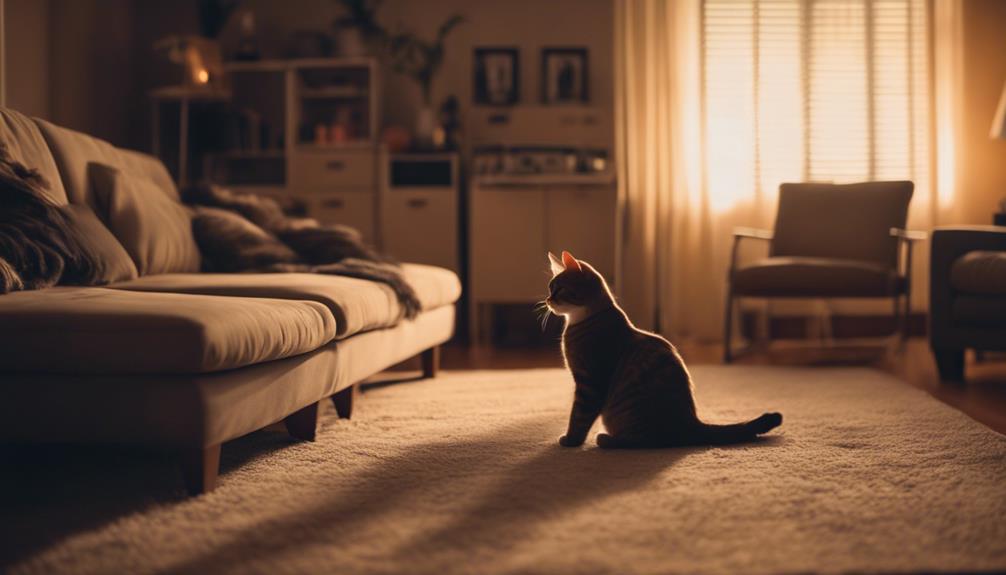
In the evening, individuals can enhance their bond with cats through consistent interactive activities and positive reinforcement techniques. Engaging in structured play sessions and utilizing specific bonding methods can significantly improve the relationship between humans and their feline companions during this crucial bonding time. Here are three evidence-based strategies to maximize evening bonding time with cats:
- Establish Bedtime Routines: Cats thrive on routine and predictability. By incorporating consistent bedtime rituals such as interactive play, grooming, and providing treats before bedtime, individuals can create a sense of security and comfort for their feline friends, enhancing the bond between them.
- Nighttime Playtime: Cats are crepuscular animals, meaning they're most active during dawn and dusk. Utilize this natural behavior by engaging in interactive play sessions during the evening hours. This not only provides physical and mental stimulation but also strengthens the bond through shared activities.
- Bonding Techniques: Use positive reinforcement techniques such as clicker training, offering treats, and gentle petting to create positive associations and strengthen the bond with your cat. Consistency and patience are key to successful bonding during evening interactions.
Factors Influencing Socialization Success
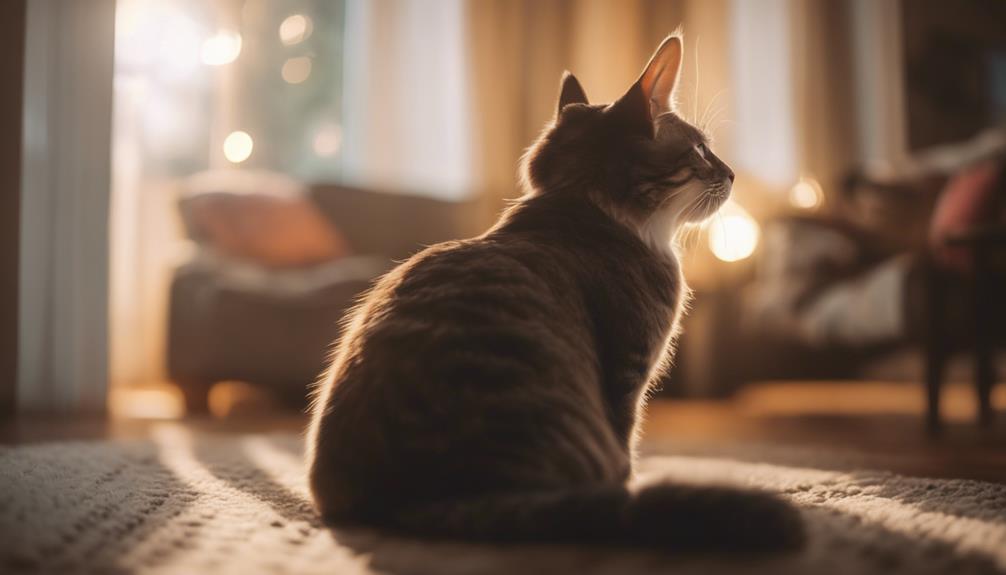
Optimizing socialization success with cats requires a systematic approach that considers various key factors influencing the bonding process. Environment influence plays a crucial role in how cats respond to socialization efforts. Creating a calm, safe, and stimulating environment can significantly impact a cat's behavior during socialization sessions. Factors such as lighting, temperature, and the presence of familiar scents can all influence how comfortable a cat feels and how receptive they're to interactions.
Effective socialization techniques are also essential for success. It's important to tailor interactions to each cat's personality and needs, using positive reinforcement and patience to build trust and rapport. Time management is another critical factor. Consistency and regularity in socialization sessions can help establish routines and create a sense of security for the cat, leading to more successful bonding experiences.
Understanding the interplay between environmental influences, behavioral responses, socialization techniques, and time management is key to fostering positive relationships with cats and maximizing socialization success.
Frequently Asked Questions
Can Cats Be Socialized Effectively at Night?
When considering nighttime socialization, it's vital to understand cats' sleep patterns. While cats can be socialized effectively at night, it's crucial to respect their natural rhythms to ensure a positive and enriching experience.
How Does the Time of Day Affect a Cat's Energy Levels During Socialization Sessions?
During cat socialization sessions, the time of day can influence energy levels. Cats tend to be more active in the afternoon compared to evenings. Morning interactions may yield better results, as nighttime behaviors could be influenced by tiredness.
Are There Specific Time Frames Within the Morning, Afternoon, and Evening That Are More Ideal for Cat Socialization?
In the quest for feline harmony, pinpointing optimal socialization windows is akin to cracking a complex cat code. Morning energy, afternoon playtime, evening calmness, and nighttime relaxation all play pivotal roles in cat-human bonding.
What Role Does Natural Light Play in Cat Socialization at Different Times of the Day?
Natural light affects cat behavior patterns. It influences their activity levels, mood, and sociability. Understanding these nuances can optimize cat socialization sessions. Different times of the day may offer varying degrees of natural light, impacting feline interactions.
Do Cats Have a Preference for Socializing at Certain Times of the Day Based on Their Individual Personalities?
Cats, based on individual personalities, may prefer socializing at different times of the day. Morning playtime and evening cuddles cater to varied needs, while afternoon bonding and nighttime exploration offer diverse interactions tailored to their unique preferences and rhythms.











